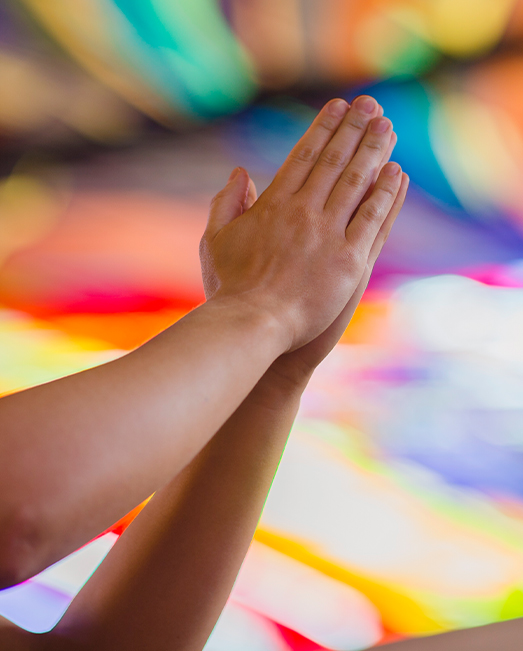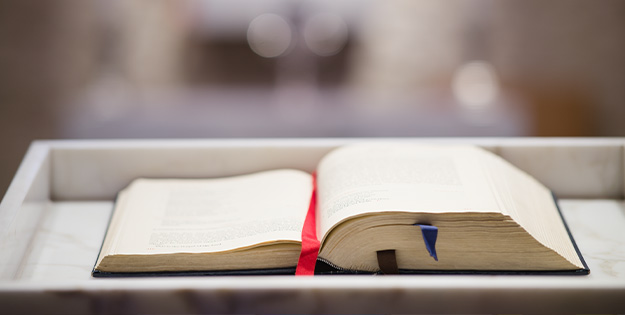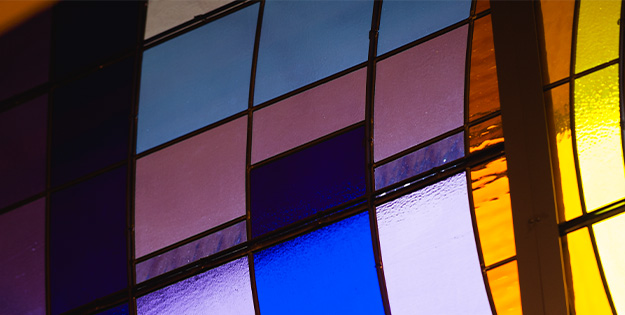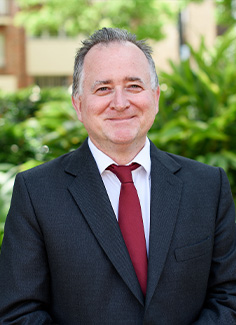Community
Copyright@ Australian Catholic University 1998-2026 | ABN 15 050 192 660 CRICOS registered provider: 00004G | PRV12008
Copyright@ Australian Catholic University 1998-2026 | ABN 15 050 192 660 CRICOS registered provider: 00004G | PRV12008

All over the world, since the very beginning of COVID-19 and the health, economic and social crises that have ensued, people have been turning to faith as a means of comfort, wisdom and solidarity.
Despite the forced closure of churches and other places of worship at different stages of the pandemic, researchers have found that many more Australians are engaging with religion and prayer.
This suggests the outbreak has led people to reassess their attitudes towards faith.
“It has certainly prompted some to reflect more closely on what they believe and what is important to them,” says Hayden Ramsay, Professor of Catholic Philosophy and ACU’s Deputy Vice-Chancellor, Coordination.
“This type of self-reflection can be a very good thing, but at the same time, it would be wrong to assume this crisis has been a healthy and life-giving experience for everybody. Not everybody has had the same level of self-reflection encounter and growth … many people have been sick and bereaved and many, particularly older people, have been terrified.”
So why do people turn to faith in upheaval? How does it help them?
We sat down with Professor Ramsay to reflect on the role of spirituality and belief in times of crisis.
“Human beings ask themselves searching questions about what is important in their lives more or less continuously, but you do find that at times of major tension and distress, people ask those deeper questions more urgently. They ask questions like, ‘Why is this happening? What does it mean for me? How can I do the right thing?’
Most of us become highly reflective in difficult times, and that’s very different to just feeling anxiety. People often do become anxious, but a much more healthy response is to start asking questions. As you do that, you realise that people around you are asking the same questions, and some people have better answers than you do, and in some cases, you might have better answers than they do. And out of that comes what the Pope calls a sense of solidarity.
Solidarity is not just a platitude. It doesn’t just mean ‘we’re all in this together.’ It means something deeper. It means we are all being faced by similar questions, and we are coming to a common understanding that others may have answers we can use and share. In Christian wisdom, and particularly Catholic wisdom, we’re not saved as individuals; we’re saved as a community. People are made for being together, and when we can’t be together because things are bad, we still have solidarity and hope that the togetherness will come.”
“I think it’s priceless. One thing that’s worth saying is that hope is different to just a general sense of optimism. Hope is not that sunny Aussie attitude of ‘She’ll be right.’ Hope has a real face to it. For a Christian, hope is God, and through the gift of the incarnation, God has a human face. That’s part of why the pandemic has been so hard in so many countries, because people have masked their faces, which has been necessary, but it’s difficult for us because we need to see each other’s faces. God Himself knew that and gave us the most beautiful face of Christ.

So hope has a name and a face, and hope is also realistic. It can’t just be a sense that somewhere over a rainbow it’ll all be sunny. Hope means you can genuinely say, ‘Okay, it’s coming. I just have to keep going’. The absence of hope can manifest in two ways: it can look like despair, and it can also look like something more arrogant – it can look like expectation. Expectation is when you don’t hope for it, you actually feel entitled to it.”
“Let me start with a qualification because I quite like the idea that faith can be useful, that it can get you through. But at the same time, that isn’t what faith is. Faith is not a tool or an object or even a gift that can help you through in bad times. It does help you through, but that’s not the first way to think of it.
All people operate within a framework of belief, and they move around this framework as they’re thinking and choosing. Faith is a particular type of framework; it’s a whole view of the world or a whole world-philosophy. Some people talk about faith as if it’s almost like fairy dust, a bit of magic that gives you a special strength. I don’t think that’s what it is at all.
Faith is a type of knowledge. When you have faith, you know things differently. You literally see the world in a different way. So, if you have strong faith, you will regard and literally see the challenges of a pandemic in a different way from someone who has no faith.
But more closely to your question, if your framework is a faith framework, then yes, that will be very helpful to you. Not in the sense that it’s like taking your vitamin C and it’ll make you a bit tougher and more resilient; rather, because you will understand difficult situations in a different way and so fare them differently. It doesn’t mean you don’t feel fear, but there’s now something you can do with that fear.”
“Human beings are living bodies. We know that from observation and science and we also know it from theology, because when God wanted to join us, He didn’t come down as a spirit, He came as a human body. So, since we have bodies, our main way of being intelligent and happy together is to physically socialise.
Not being able to touch has been necessary, but it’s also been a terrible thing. I think that bodily beings have to worship together as a community, and I think that churches and religious buildings and other sacred sites matter desperately to us. We need a sense of the sacred, and it doesn’t just come from words and thoughts, it comes from sacred places. If you’re a Catholic, within the Church, the most sacred place of all is the tabernacle behind the altar, where the Blessed Sacrament is reserved. That is Christ physically present inside a physical receptacle on top of a physical altar, in a physical church from which people physically receive Holy Communion.”
“If you go back to earlier plagues, medieval plagues, there was science. The word ‘science’ simply describes the base knowledge you have for a particular phenomenon. So there was science, and in those days, most of the people who had the best science of the day would have been educated people, so they would have probably been monks or priests or clerks working within a religious framework. So I don’t think it’s right to say that religion was a substitute for science in the past, I think it’s that there was a different science, and a different relationship between science and religion.
Today, do you have a tension? Yes, you often do, but the teaching of the Catholic Church is that anything that is scientifically true is consistent with Catholic faith. It’s not that there’s scientific truth and religious truth and the two have to fight it off; rather, if something is established as genuinely scientifically true, then it will be compatible with the faith.
The real tension isn’t between science and religion, it’s between people. So you might find two people: one who is guided by their religion, and the other who is guided by their reading on the latest science. And that’s a personal tension for people to resolve, like any other tension.”
“I think part of the problem is that there are religious believers, including people in my own Church, who don’t pay enough attention to reason. This is just a misunderstanding of what faith is. Faith can only be understood and explored with reason; you can’t really take the two apart. Our faith isn’t a spooky fairy dust that suddenly opens your eyes. Faith is being able to think in a completely new way about reality, about people, about God and about possibilities.”
“I can see why that might happen. If you consider a crisis within your own life — the crisis that will eventually come when you are ill or get very old — when that happens, we know that people who have not been religious believers sometimes call on the assistance of a clergyman or a representative from some religion. They’re confronted with the thought their actions may be the last ones they will take, so they want to put things in order. Now, if some individuals do that with a personal crisis, I think it probably follows that whole societies in a crisis will do the same.
If people are trying, in the middle of the catastrophe, to find meaning and to identify the direction they wish to turn, I think that’s a good thing. Do I think it will lead to a great revival of religion? I have not seen any evidence of that. I think religion is not just about attending mass or going to the mosque; religion is about understanding your life in a certain way. And perhaps some people will now start understanding things differently, which might lead them to God.”
“I imagine one thing that’s been made very clear is the fact of human vulnerability. Some of us, particularly if we’ve experienced some illness or a family member dying, we have that vulnerability thrust in front of our eyes. Other people can live as if there is no tomorrow. You have teenagers who understandably think they’ll never die, or middle-aged people who are very successful and they’re living it up and thinking, ‘Well, the nursing home is decades off for me.’ One good thing we might take out of this pandemic is a sense of our shared vulnerability.

A lot of the qualities and virtues we try to build in ourselves, we do because we’re vulnerable. If we were invulnerable, if we were like Superman and Wonder Woman, we wouldn’t have to worry about much. We wouldn’t need our mates to hold us up in bad times. We wouldn’t have to worry about striving and pushing ourselves at work to get ahead. We wouldn’t have to build ourselves up against sickness and disease.
The fact is that, as humans, we are vulnerable. That explains why the things we value are a sense of achievement, striving, sacrifice, nobility … a sense of protecting ourselves and being willing to protect others. So I think it would be a really good thing if we came out of this pandemic with a sense that we’re vulnerable, but that doesn’t mean we’re weak, because we can do something about our shared vulnerability.”
“It should teach us that suffering and sacrifice are not just unexpected difficulties there for us to overcome, they’re actually part of the human path. We are animals, we are parts of nature, and so we will suffer. Animals can only survive as natural beings by killing other animals or plants. One living thing thrives at another’s expense; we use other parts of nature to survive and thrive. That might sound a bit gloomy, but it’s just a reminder that we’re not merely minds or spirits, we are also parts of nature, and that means suffering is built into the whole.
So, what difference does faith make? Well, of course, it’s a transformative story of suffering. For Catholics, the story of the universe is the story of Christ offering Himself to His Father, and us trying to find ways of sharing in that offering. It’s the sense of a willing sacrifice of self, through suffering and on to glory.
All the things we’ve talked about, hope and faith and love, they are critical in helping us to cope with crisis, but not just like a compass that gives you a direction and brings you out the other side unscathed. Rather, what religion does is it lets you understand the crisis as something you can cope with, because Christ coped with everything, and you come to the other side changed.
And in coping, you can always do something to help others cope, and you have the knowledge that good people around you, in His name or in the name of their God, will do what they can to help you in return.”
Hayden Ramsay is ACU’s Deputy Vice-Chancellor, Coordination and a Professor of Catholic Philosophy.
Find out more about ACU’s mission and values.

Copyright@ Australian Catholic University 1998-2026 | ABN 15 050 192 660 CRICOS registered provider: 00004G | PRV12008